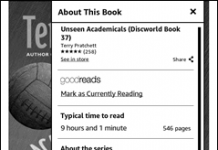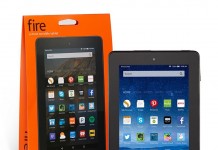FIRST, two reports by Joel in the Comments area of the Kindle Cloud Reader announcement story, who has found that:
1. he can run “multiple” instances of the Cloud Reader (reading one book while another is open for reference) and
2. the Cloud Reader counts as one ‘single’ device. He has the Kindle Cloud Reader app running on 3 PCs and one Linux box so far.
I noted that my Kindle App for PC is shown on my ManageYourKindle as a total of 3 Kindle-compatible devices, one each for my desktop, a laptop and a netbook. Cloud Reader acts as a true Web device then, as there’s no installation and you can access the Web and your spaces on it from any Net-connected devices, so it’s similar.
“Time to Rethink Every Website in the World”
TechCrunch’s Cyan Banister, in his story titled, “Time to rethink every website in the world,” writes (after opening with an assessment of “holy sh__”) that another news analyst had written about the new reader but:
‘ … he didn’t point out what an amazing technical advancement this is for all of us. To me, it hardly matters that it looks great on my iPad. The coolest part is that it works beautifully OFFLINE.
Gmail and a few other sites have creaky offline modes, but they aren’t nearly as cool as what Amazon has done. (For instance, Gmail doesn’t even have an offline Outbox.) What Amazon has built is a sneak peek at our Internet future and this will change everything. ‘
ITWorld
ITWorld’s Brian Proffitt points out that while it’s not a true iOS [Apple] app, you can set the shortcut as an iPad, say, home screen icon, so it does have a direct way to the Kindle Store, in effect.
Via Andrys Basten’s A Kindle World Blog
100% of rival vendors’ profit (net revenue), not 30% of that.
Almost all the news-sites have reported this new Web-app capability as a way to evade giving Apple 30% of Amazon and Barnes & Noble profits — but, actually, since Apple itself created the ‘Agency’ model, which had Big5 publishers alloting online bookstores 30% of an ebook sale and taking 70% for themselves, Apple would actually have been trying to take 100% of Amazon’s or BN’s book-sale profits from sales on the iPad app. We can see one reason why Apple does so well, profit-wise.
That 100% of profit grab is a huge reality in it that many don’t understand that it wasn’t 30% of profit but 30% of a book sale.
It’s not similar to taking a fee for a lemonade stand in a mall. It’s telling the lemonade stand vendors, ‘Sure, sell, here, but we want 100% of your profits if we let people try your wares here.‘ There was no way the bookstore vendors would go for that.
Taking a cut from sales from applications on a computer operating system
Besides, others have made the point that Microsoft’s computers do not insist on a 30% profit from products sold by websites using their “devices.”
Chrome and Safari were chosen first, Proffitt opined, because it was the only way to get the new Web-based app onto an Apple device at a time when that became very useful. Chrome and Safari browsers share a basic source in Webkit, and what works in one browser will tend to work in the other.
As has happened in the past, more features will be added as it goes, and more browsers will be included, since at the moment neither Firefox nor Internet Explorer work with the Kindle Cloud Reader.
Proffitt predicts browser wars, with each offering features the others don’t have, and developers will have to keep making adjustments to their web applications, probably with browsers that have larger market share getting first attention. Not in the initial case though!
Web apps galore
Bloomberg Businessweek’s Om Malik focuses on the many Web-apps coming out of the cloud-space.
We’ve already had Google’s web app for books mentioned here in early December, at the same time that the competitive Amazon announced their Kindle for Web, which was meant to include full books eventually and now does, as Cloud Reader. Amazon has finally changed that product page to show former Kindle for Web as Kindle Cloud Reader now.
Malik also mentions Pandora’s relaunching of its website for tablets in July.
Twitter just launched an HTML5-based Web client that he feels is “as fantastic as the dedicated app itself.”
WalMart launched an HTML5 version of its VUDU video-streaming Web app, which streams not only to web browsers but also to TVs, Blu-ray players and game consoles. However, as with normal websites, VUDU streaming is available only in standard definition.
Walmart’s iPad-Optimized Movie Streaming
Mashable’s Sarah Kessler shows how VUDU’s Web app works and also mentions that the Financial Times released a web-based app in June and avoided the Apple app store, while ebook/ereader seller Kobo has announced it’s also building an HTML5 ereader app.
The Globe and Mail’s Associated Press story by Peter Svensson reports that
“The site already works with PC browsers, but the Flash technology used doesn’t work on the iPad. Instead, Vudu is using “Live Streaming” tools from Apple to reach the tablet.
“Vudu.com’s business model is similar to Apple’s own iTunes. It rents out movies for $1 to $6 for a 24-hour or 48-hour viewing period. It also sells them for $5 and up, which allows viewing any time. Its claim to fame is that it has many movies on the same day they’re released on DVD.”
Well, that particular new Web app was of interest to me because it is competition for Netflix, which has been steadily increasing its rates and of course it’s also competition for Amazon’s video-streaming.
Svensson ends by saying that while the VUDU site will also work with iPhones and iPod Touches, navigation would be difficult as the Web app is designed for tablets. The movies even stream over 3G, “but the image quality will suffer” and would also eat a lot of the monthly data allowance of any iPad plan.
What does it mean for Apple?
CBSNEWS techtalk references The Atlantic‘s Rebecca Greenfield whose harshly worded report (titled, The Beginning of the End for the Apple App Store) is surprising.
First, I’ve not read The Atlantic for some time but to see the words “lame” and “stinks” is quite a change from the magazine I’ve read earlier. I don’t entirely agree with her headlined’ take since I know Apple’s app store will be affected negatively but not to the extent she predicts, but it’s an entertaining, eyebrow-lifting read
If nothing else, what we’ve seen does look like the strong beginnings of a fairly huge media-vendor rebellion against Apple’s policies.
THE LAWSUIT against Apple and the Big5 Publishers
IT Government’s Grant Gross (delivered by Compuworld) writes that:
” One consumer advocate said the lawsuit makes sense. ‘I have long been concerned about the apparent monopoly power Apple has been able to exercise through its Apps Store,’ said John Simpson, consumer advocate at Consumer Watchdog. ‘I believe the plaintiffs in this class-action suit have a very strong case and [I] am pleased they brought the action. ‘
“Apple didn’t want to enter the e-book market at the prices Amazon.com offered, Berman said. Instead of competing with Amazon, ‘they decided to choke off competition through this anti-consumer scheme, he said.
“The European Commission and several U.S. state attorneys general are also investigating e-book price fixing. “
The question of “collusion”
InformationWeek’s Thomas Claburn points out some factors in the accusations of “collusion”:
‘ The complaint goes on to allege that the publishers were able to force Amazon to switch from the wholesale model to the agency model because each knew other publishers had also agreed to adopt the agency model to work with Apple.
What’s more, the complaint says, if the publishers had not conspired to set prices, consumers would have voted with their wallets and bought books elsewhere. And that’s apparently what happened: Random House, the only large U.S. publisher that didn’t switch to the agency pricing model last year, saw its ebook sales surge 250% in the U.S. in 2010 and 800% in the U.K.
But in March 2011, Random House switched to the agency model because, the complaint states, Apple refused to carry its titles in its iBookstore.
Apple, the complaint asserts, conspired with its publishing partners to “cut into Amazon’s substantial share of the market for ebooks and to prevent Amazon from emerging as a serious competitor to its mobile platforms for distribution, storage, and access of digital media.” ‘
Getting back to the Kindle, specifically
Sys.con Media’s Udayan Banerjee (CTO of NIIT Technologies, with 30 years’ experience, focusing on emerging technologies) writes today about why he bought a Kindle and why not iPad or Galaxy, or any device with color, touch, easier browsing etc. He writes from India and often is in the U.S. It’s a straightforward report of a more personal nature, and he ends it with “I just wish that I had a magic wand which I could use to transfer all my physical books into the Kindle.”
That would be true of any good e-Ink e-reader, but most of us who already have e-readers will recognize the wish, not that I don’t still get paper-bound books as a B&N member who still values going to the brick and mortar within a mile of my home and hope it stays around.































